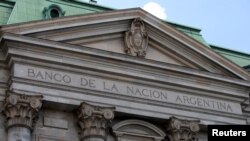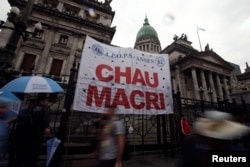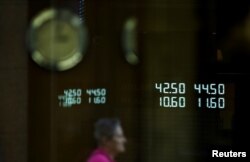Argentina's inflation rate accelerated for the third straight month in March, the government statistics agency said on Tuesday, prompting the central bank to unveil fresh measures to temper raging inflation and protect the embattled peso currency.
The recession-hit country's consumer prices rose 4.7% for the month, taking the year-to-date increase to 11.8%. Rolling 12-month inflation is running at 54.7%, the National Institute of Statistics and Censuses (INDEC) said.
"That's a very bad number," said Alberto Bernal, chief emerging markets strategist at XP Investments in New York, adding it would force the country's central bank to keep already-sky-high rates elevated to help protect the peso currency.
Argentina has been taking measures to fight inflation since last year, when prices rose 47.6%, battering consumers' spending power and dampening President Mauricio Macri's popularity ahead of make-or-break national elections later this year.
Latin America's No. 3 economy has also been hit by broader financial turmoil that has left a third of the population in poverty, forced interest rates upward and sent the beleaguered peso currency tumbling against the dollar.
Argentine central bank chief Guido Sandleris said in a press conference after the data that the bank believed the pace of inflation would start to ease from April.
He added the central bank would reinforce the "contractionary bias" of monetary policy, which includes freezing a non-intervention peso trading range until year-end and holding off from buying dollars to rein in the currency if it strengthens outside the range until the end of June.
The bank had bought nearly $1 billion at the start of the year to help bring the currency back inside the range.
The International Monetary Fund said it welcomed the central bank's announcements.
"We are confident that continued efforts in this direction will help to bring inflation down in the coming months," IMF spokesman Gerry Rice said in a tweet.
'Intense' Data
Goldman Sachs said in a client note that the significantly larger-than-expected jump had been driven by rising prices for food, clothing, regulated tariffs and seasonal school tuition fees.
The investment bank described the March data as "intense," adding that while the annual inflation figure should moderate, it would still likely end 2019 at an "extraordinarily high" 36%.
Argentina's peso, one of the year's worst-performing currencies globally, fell 1.79 percent on Tuesday after recovering last week from recent record lows against the dollar.
Economists polled by Argentina's central bank earlier this month sharply raised their forecast for full-year 2019 inflation to 36% from a previous estimate of 31.9%.
Analysts said price rises could be starting to peak and should start to slow from next month. March was the fastest rise since October last year when prices rose 5.4%.
"Only in May we will be able to see monthly inflation slowing, due to lower impact of tariffs and because it is a month with few seasonal increases," said Lorenzo Sigaut Gravina, a director at consultancy Ecolatina.







